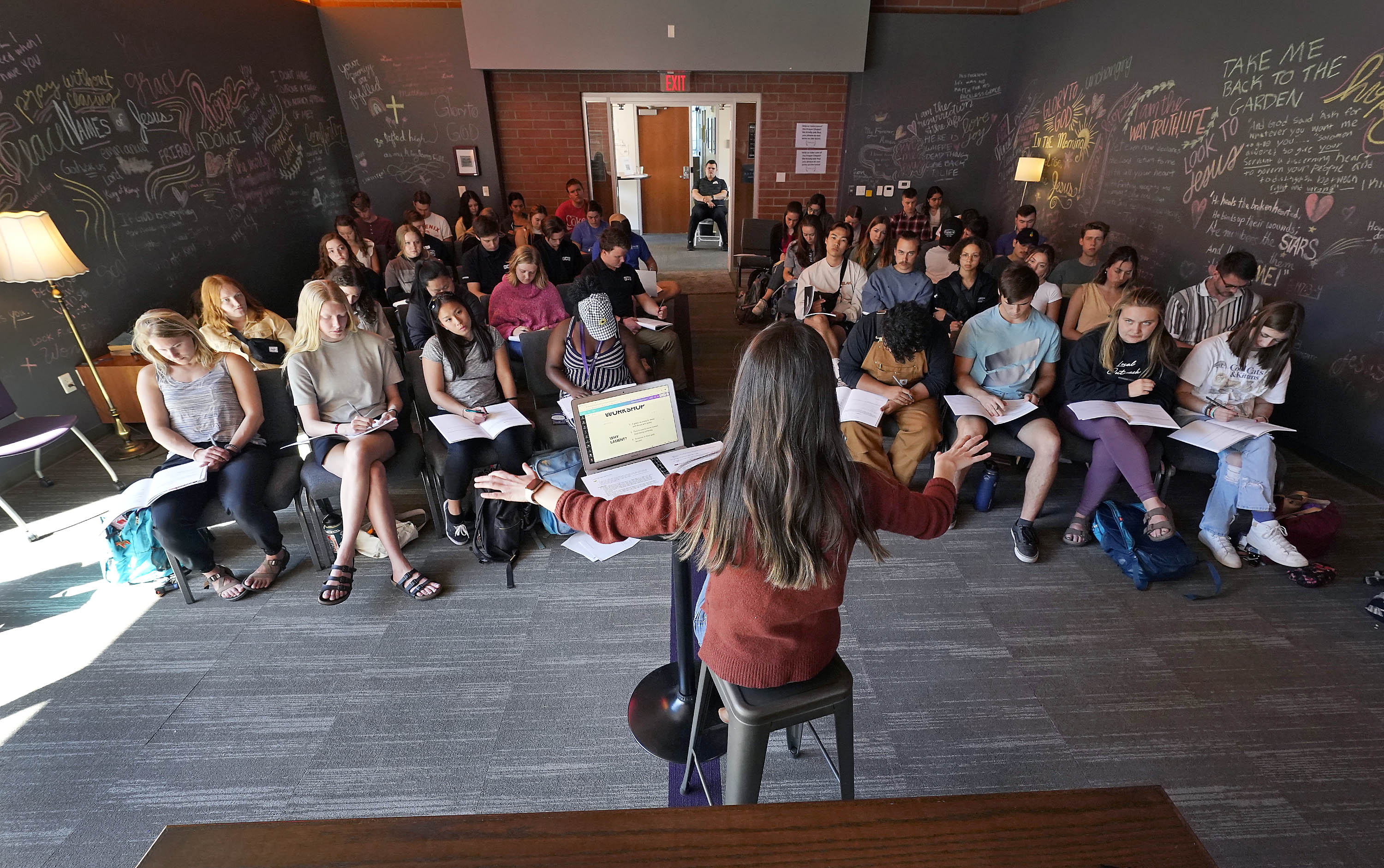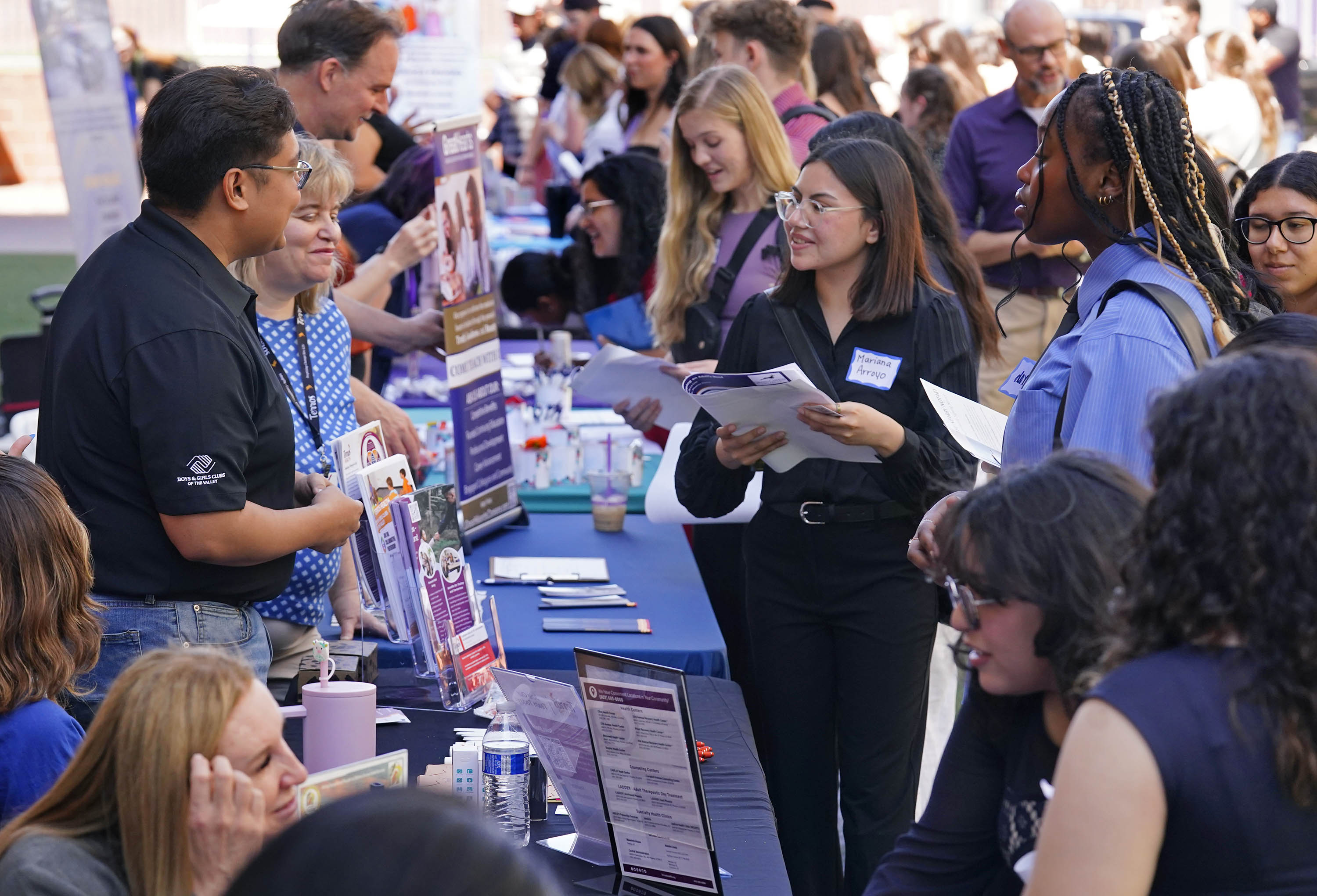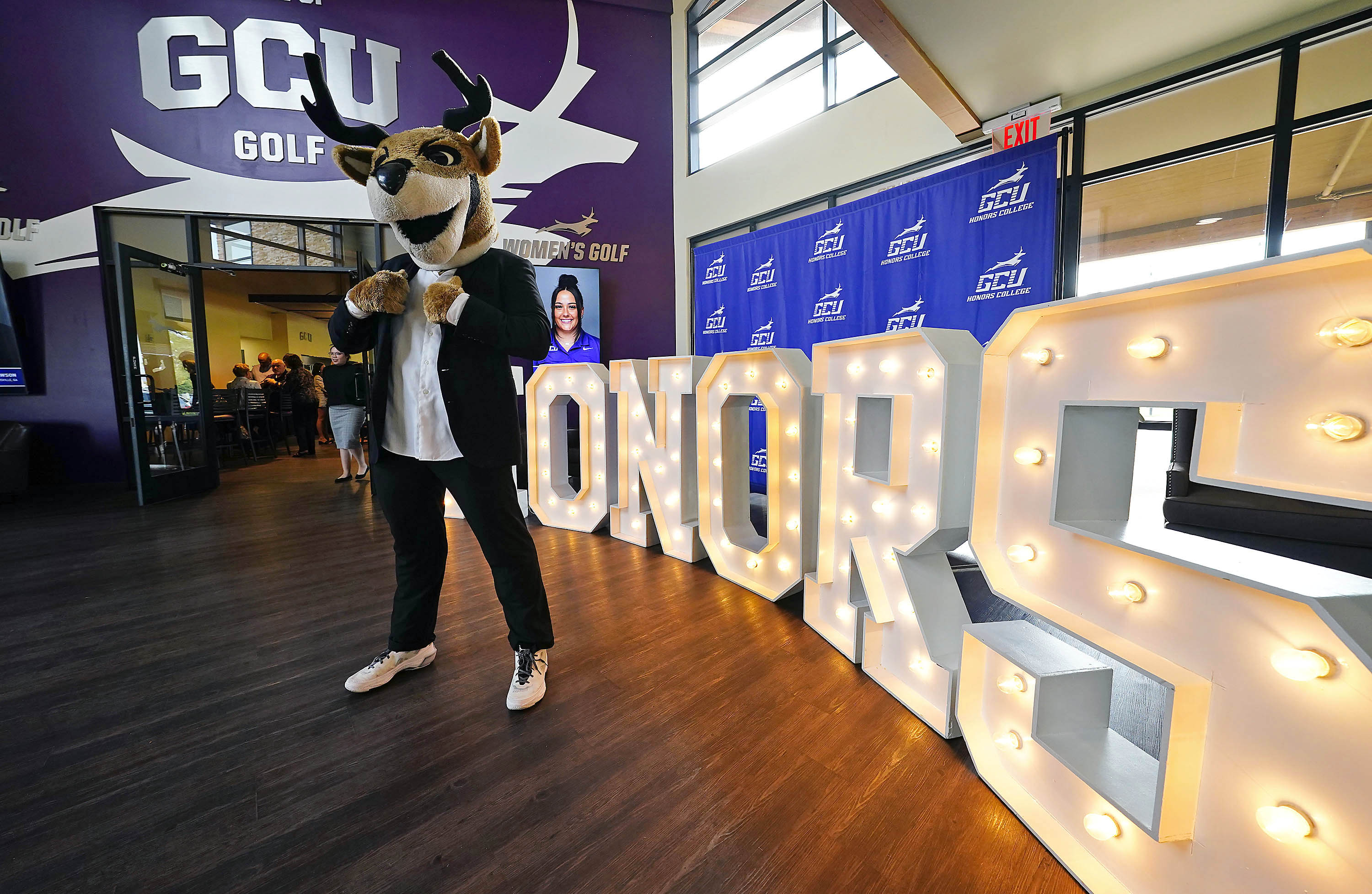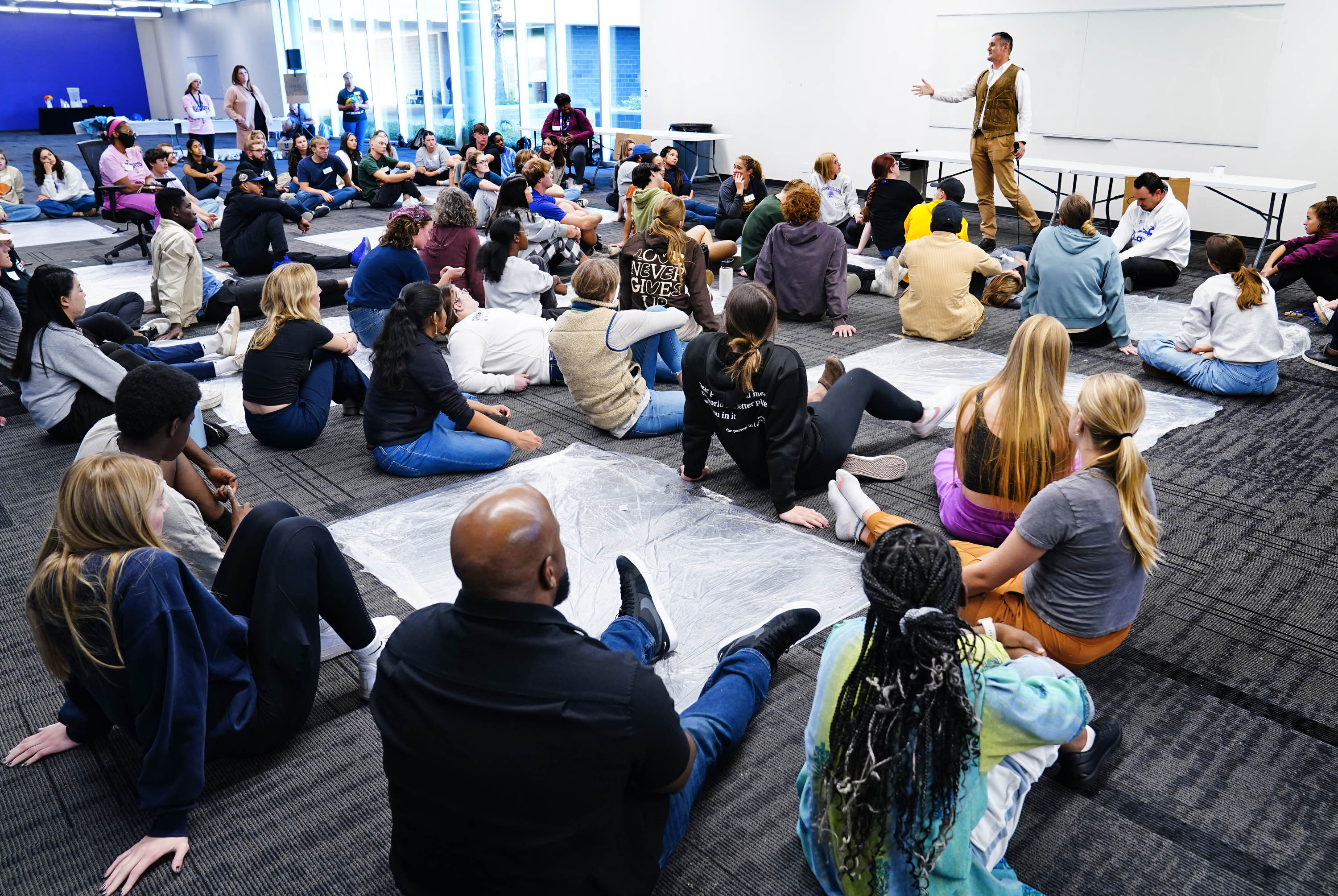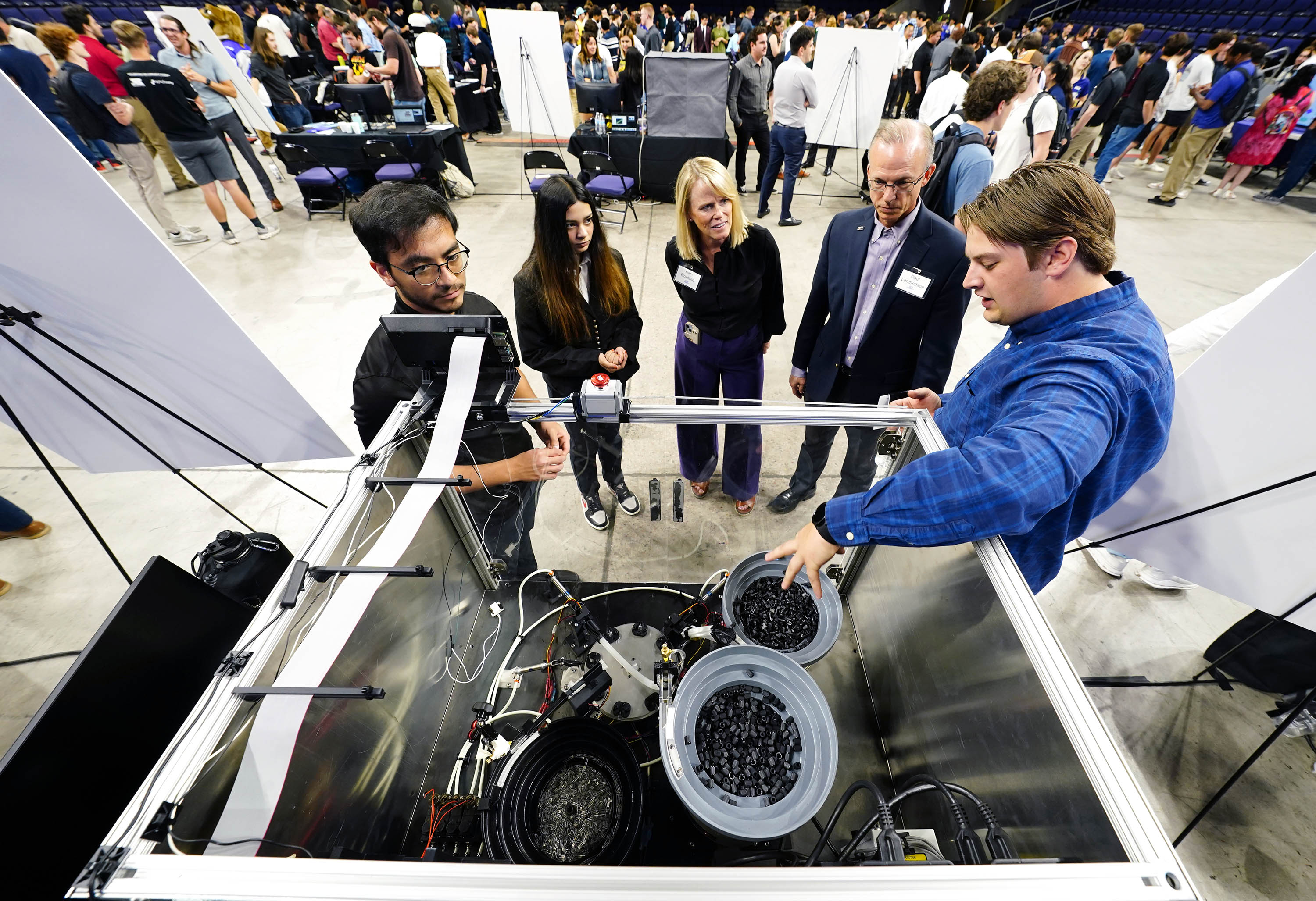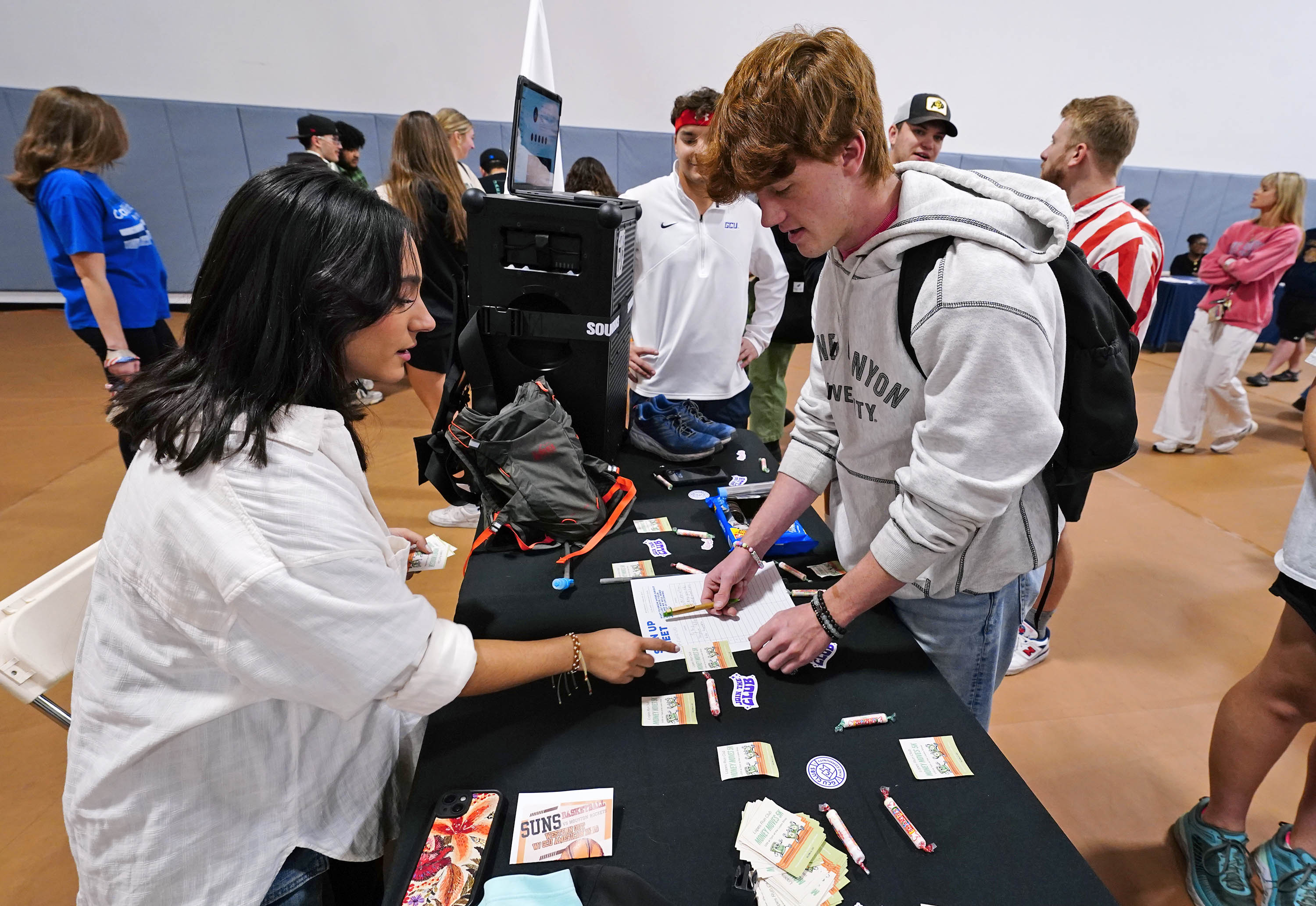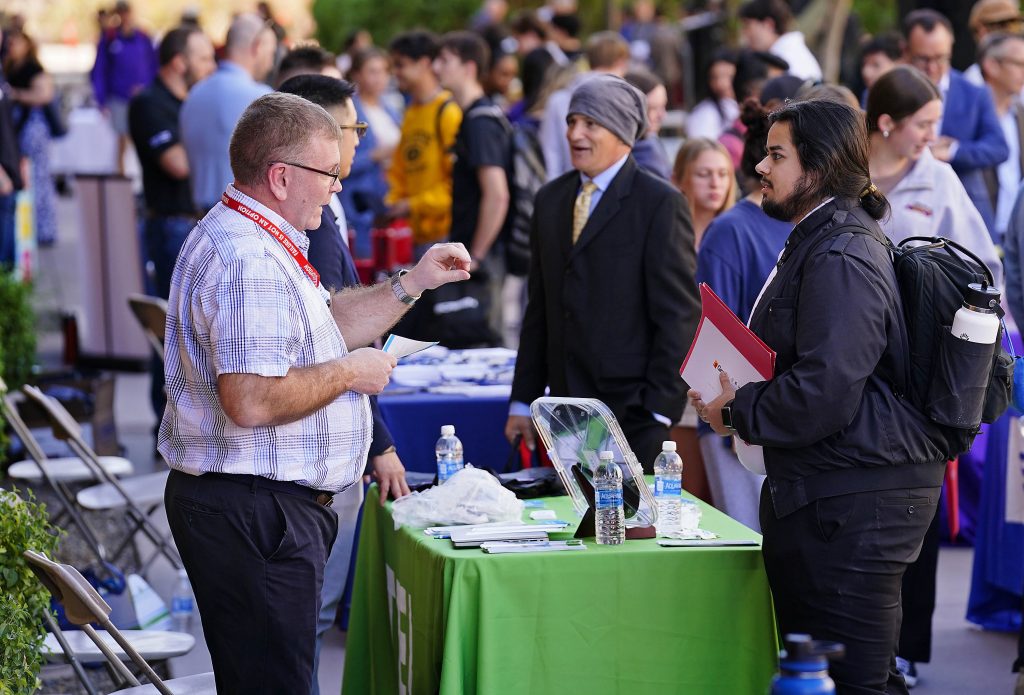
Photos by Ralph Freso
Here’s the thing about semiconductors: They’re something a lot of people say they don’t know anything about, even though they power everything from computers to cellphones to refrigerators.
But by the end of Thursday, Grand Canyon University’s first Semiconductor Day, students knew a lot more about the tiny chips that serve as the brains of all electronics.
They also walked away from the event knowing this: There are a LOT of jobs in the booming semiconductor industry, and if you want one of them, Phoenix is a good place to be.
The Semiconductor Industry Association projects the workforce will grow by nearly 115,000 jobs by 2030, from approximately 345,000 jobs today to approximately 460,000 jobs by the end of the decade, which represents a 33% growth.
Of those new jobs, roughly 67,000, or 58%, risk going unfilled at current degree completion rates.
“Right now, because of the growth in Arizona, there seems to be a talent shortage, or talent gap, so we’re trying to help our member companies on these types of issues,” said Lin Tso, senior programs and events manager at SEMI, a global trade association of more than 3,000 member companies. SEMI organizes innovative conferences, from artificial intelligence to quantum computing to, of course, workforce and education events, like GCU’s Semiconductor Day.
The bottom line: the industry needs people.
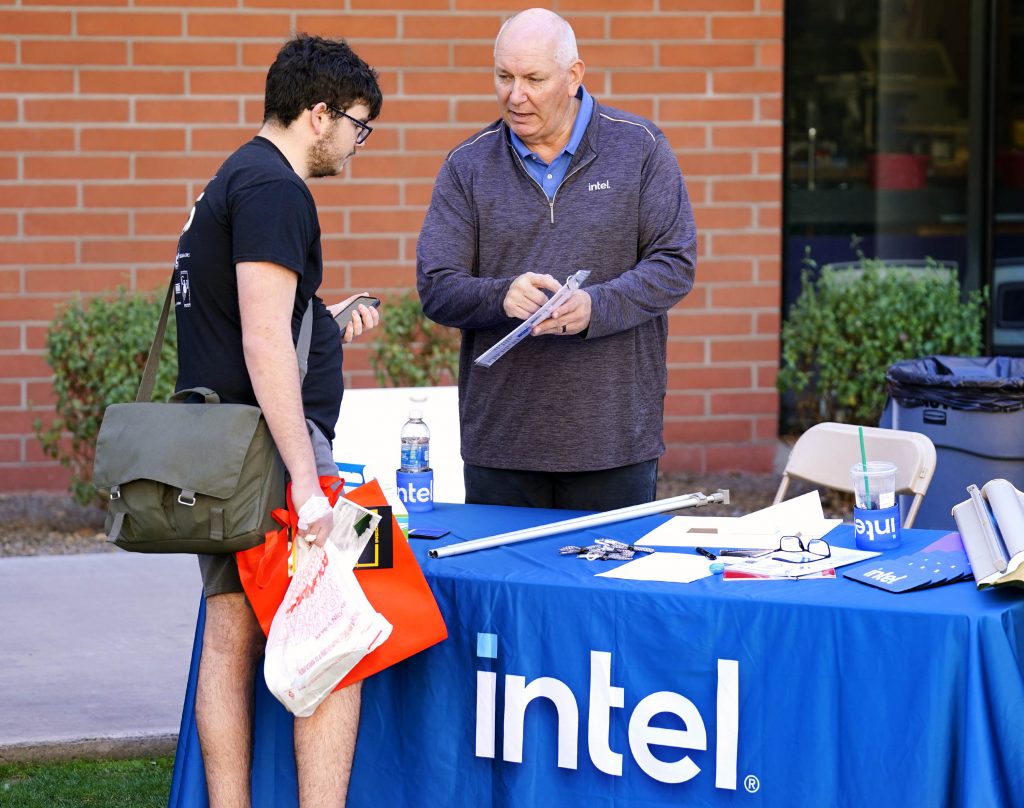
“And the right type of people,” Tso said, “like field service engineers and process engineers and, not only engineers. Every company will need sales and marketing, they need finance, they need manufacturing.
“It’s, really, everything.
“One of the goals of SEMI is to kind of network and help and connect all of the electronics supply chain.”
Fifteen companies in the semiconductor space dropped by GCU’s Engineering Building courtyard on Thursday, from household names, such as Intel and Nikon, to not-as-well-known companies, such as EMD Electronics and NXP.
The event was a highlight of Engineering Week, which wraps up today with a catapult-launching competition featuring catapults designed by student engineering teams.
“This is a huge collaboration across the University with many colleges and departments involved,” said GCU Career Services Executive Director Aysha Bell of Semiconductor Day.

“This is the first time we’ve had a semiconductor-focused outreach,” added Haylie Fagerlie, GCU’s Assistant Vice President of Industry Relations and Strategic Partnerships, though the University partnered with SEMI virtually during the pandemic at an event attended by a large number of students.
“Due to the big market shift of all of the large chip manufacturing companies and all their suppliers coming to the market, we’re trying to do a lot more education and outreach to our student population of all the jobs that are here – and all the jobs that are coming,” added Fagerlie.
“These companies are all large-hiring-pool companies trying to build their Arizona presence but also trying to build their talent. … A lot of them are doubling or quadrupling their footprints in Arizona.”
Spencer Wall, vice president of sales and marketing for DSV, the “third largest global transport and logistics company in the world that you’ve never heard of,” called Phoenix “the new Silicon Desert.”
He referenced SEMICON West, a fixture in the San Francisco Bay Area for more than 50 years, and how it’s moving to Phoenix starting in 2025. The move signals how the Valley has established itself as a leading semiconductor manufacturing hub.
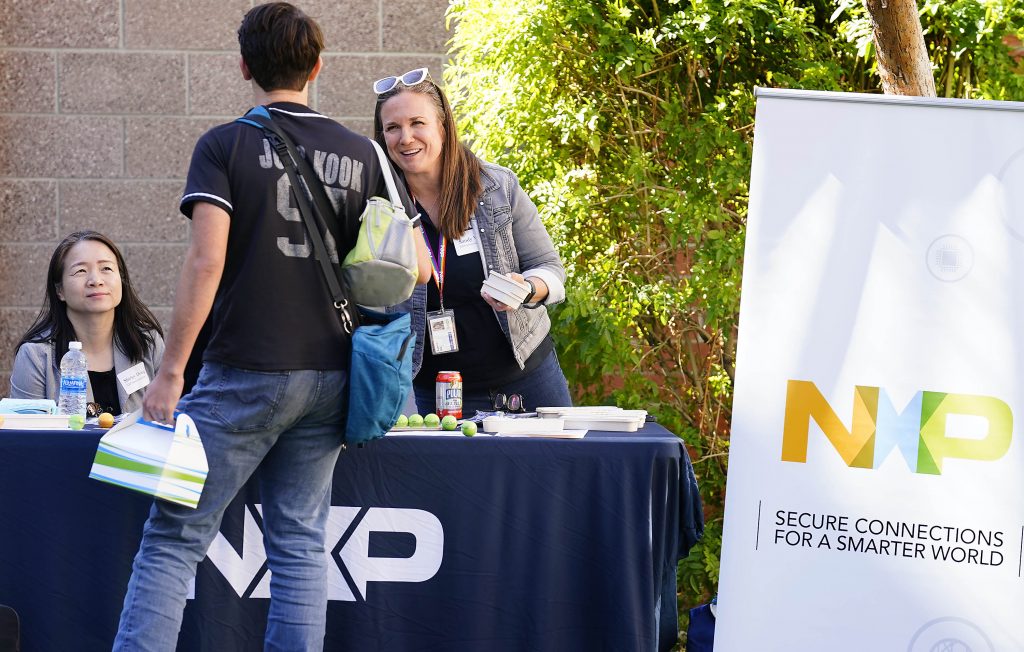
Phoenix is home to more than 75 semiconductor companies employing more than 100,000 people, the biggest buzz in the last couple of years surrounding the arrival of Taiwan Semiconductor Manufacturing Co. The $40 billion megaplant is going up on 1,000 acres in north Phoenix. It has generated an estimated 21,000 construction jobs, with the company expected to double its Phoenix workforce from 2,000 initially to 4,500, according to the Arizona Republic.
Fagerlie pointed also to Intel, the world’s second largest producer of semiconductor chips, which is building two chip factories at its 700-acre Ocotillo campus in Chandler, Arizona, at a cost of $20 billion. It is the largest private-sector investment in Arizona history.
She also mentioned Amkor Technology, which provides semiconductor packaging and testing services. It’s investing in a $2 billion facility in Peoria, Arizona.
GCU wants to educate its students about those jobs and, ultimately, connect them to employment.
“Our main goal: We’re trying, obviously, to be career-oriented and make sure students understand the new market that Arizona has,” Fagerlie said.
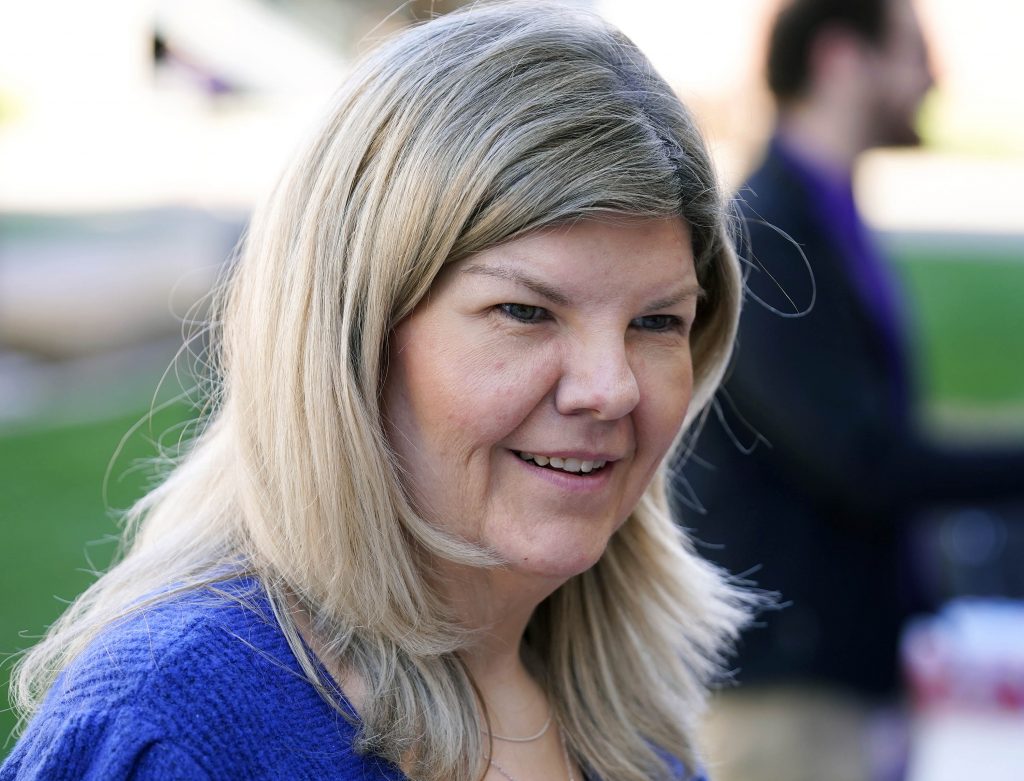
Samantha Russell, Director of Interdisciplinary Engineering Capstones, was instrumental in bringing about Semiconductor Day.
“Last year, when we did (Engineering Week), and with the CHIPS Act coming out and the big push on semiconductor, I thought, ‘Wouldn’t it be wonderful if GCU could host an entire day dedicated to the semiconductor industry?”
The CHIPS and Science Act, signed into law in August 2022, allocates $280 billion to boost U.S. semiconductor capacity, encourage research and design, and create regional high-tech hubs and a more robust STEM workforce.
“Thankfully, here in Arizona, we’re on the receiving end of that,” Russell said.
She added that what she hopes students learn from Semiconductor Day is that there is a rich landscape of companies out there.
“It’s more than just Intel and TSMC,” she said. “Those are the big names that everyone hears. But there’s so many companies that are a part of that.”
One of those companies is NXP, a semiconductor company with a presence in 30 different countries. It employs 30,000 people and brought in $13.5 billion in revenue in 2023.
NXP Director of Research and Development Dr. Sandy Vos, who is based at the company’s Chandler, Arizona, site, designs sensors for cars, such as air bag and low-tire-pressure sensors. She was at Semiconductor Day to tell students about her company and the industry, “especially in Phoenix – it’s such a boom town in semiconductors. We’re just happy to get the word out about the cool stuff we do,” she said.
-
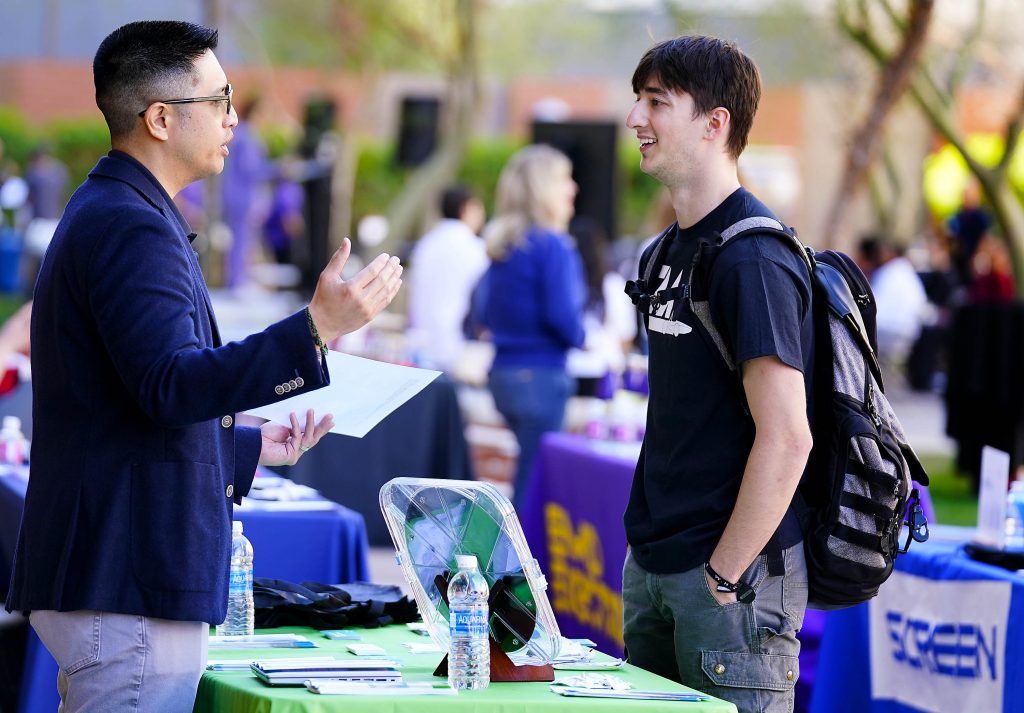
Junior Tyler Palanuk (right) talks with Jason Spears, military programs manager and talent acquisition for TEL, during the Semiconductor Day event outside the Engineering Building.
GCU doctoral student and engineering advisory board member William Haffelder works as a field service engineer supervisor in Austin, Texas, for Tokyo Electron Limited (TEL) and also spoke to students on Semiconductor Day.
“What we’re trying to convey to students is we’re not looking just for people that want a job. We want people who want a career,” said Haffelder, who drops in to speak to classes often and educates students about the semiconductor industry.
Jason Spears, military programs manager and talent acquisition for TEL, said at the event, “We’re as big as Nintendo,” though, “I’m sure you guys have never heard of us.”
The company, which has branches in Chandler and Phoenix, spans 77 sites in 18 countries and regions, he said, and is looking for engineers and interns to work in states like New York, Texas, Idaho and Minnesota, to name a few.
“We’re the guys in the background. … We make the stuff that makes the money for everybody, so keep that in mind,” he said.
One of the places TEL has a presence is Oregon, which piqued the interest of Tyler Palanuk, a junior mechanical engineering and technology student.
“They have an office 15 minutes from my home in Oregon,” said Palanuk, who ran off to print a new, updated resume for Spears. He needs experience before he graduates, he said, and learned Thursday just how big the semiconductor industry is.
It’s an industry, added GCU’s Samantha Russell, that’s fast-moving.
“It’s constantly changing and, with that, they need new blood. That’s what our students are.”
Internal Communications Manager Lana Sweeten-Shults can be reached at lana.sweeten-shults@gcu.edu.
***
Related content:
GCU News: Honeywell Day builds on student interest
GCU News: GCU helps Scottsdale-based company pilot internship program
GCU News: Cyber program earns prestigious National Security Agency designation







